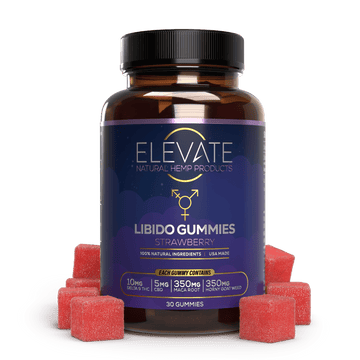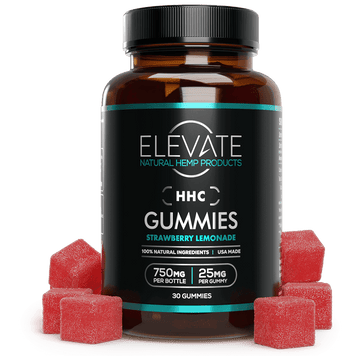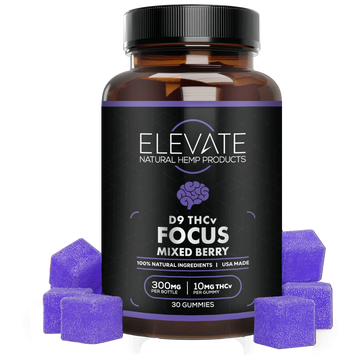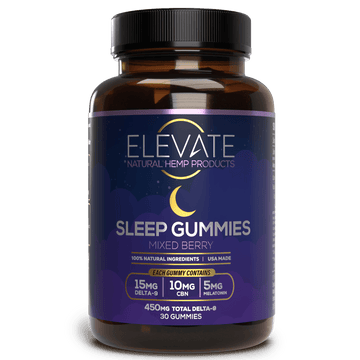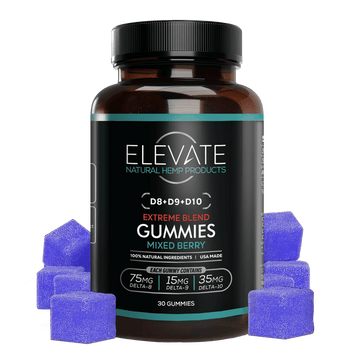What Is Delta-11 THC? A Beginner's Guide

Delta 11 THC (11-hydroxy-THC) is a metabolite created by your liver when you eat THC.
Key facts:
- 2-3x more potent than Delta 9
- Only produced when you eat edibles (not from smoking)
- Responsible for intense edible effects
- Lasts 4-8 hours
Products marketed as "Delta 11" are edibles designed to maximize this effect.
Table of Contents
- So, What Exactly Is Delta-11 THC?
- Why Try Delta-11 THC?
- What Does Delta-11 THC Feel Like?
- How Delta-11 Compares to Other Cannabinoids
- How Long Do the Effects Last?
- How Long Does Delta-11 Stay in Your System?
- Is Delta-11 Legal?
- Is Delta-11 THC Safe to Use?
- Where to Buy Safe Delta-11 THC Online
- Frequently Asked Questions
- Key Takeaways
- Related Articles
You’re probably familiar with Delta-9 THC and its popular cousins, Delta-8 and Delta-10. But the cannabinoid family is always expanding, and now there’s Delta-11 THC. With so many hemp-derived products popping up, it’s easy to feel lost in the noise. Is this just another compound in the lineup, or is there something different about it? We’re here to cut through the confusion. We'll give you a straightforward look at what Delta-11 actually is, how it feels, and how it truly stacks up against the cannabinoids you already know.
With so many options, it's no wonder people don't know what to pick and often rely on trial-and-error methods or advice from trusted relatives. If you're wondering about Delta-11 THC, how it differs from other cannabinoids, and what effects it might have, here we are. We will break it down in a way anyone can understand.
So, What Exactly Is Delta-11 THC?
Delta-11 THC is a lesser-known cannabinoid that is starting to gain attention within the cannabis community. Like Delta-9 THC, Delta-11 THC is a psychoactive compound, meaning it can produce a “high” when consumed. The “Delta” in its name refers to the position of a double bond in its molecular structure, which differentiates it from other forms of THC. While Delta-9 has the double bond at the 9th carbon chain, Delta-11 has it at the 11th position. This slight difference in molecular structure is what gives Delta-11 its unique properties.
Delta-11 THC occurs naturally in cannabis, but only in trace amounts. Because it’s present in such small quantities, it’s not as easily extracted or studied as its more famous counterparts, like Delta-9 or Delta-8 THC. However, with advances in extraction and synthesis techniques, Delta-11 is becoming more accessible, leading to increased interest in its potential uses and effects.
How Delta-11 Products Are Made
Delta-11 THC is a minor cannabinoid, meaning it appears in very small quantities in hemp and cannabis plants. This rarity makes it impractical to extract directly from the plant material in large amounts. Instead, the Delta-11 found in consumer products is typically created in a lab through a process called isomerization. This process involves taking a more abundant cannabinoid, like CBD, and using a chemical catalyst to rearrange its molecular structure into Delta-11 THC. This method allows producers to create a consistent and reliable supply of this unique compound, making it accessible for products like vapes and edibles. It’s a sophisticated scientific process that transforms one hemp-derived compound into another.
The Difference Between Delta-11 THC and 11-Hydroxy-THC
It’s easy to get Delta-11 THC confused with a similar-sounding compound, 11-hydroxy-THC, but they are two very different things. Delta-11 THC is a cannabinoid that is naturally found in the cannabis plant. On the other hand, 11-hydroxy-THC is a metabolite, which is a substance your body creates when it processes other cannabinoids. Specifically, when you consume Delta-9 THC through edibles, your liver breaks it down and converts it into 11-hydroxy-THC. This metabolite is known for being significantly more potent than Delta-9 itself, which is why edibles can feel much stronger than other consumption methods. So, to put it simply: Delta-11 is from the plant, while 11-hydroxy-THC is made inside your body.
Why Try Delta-11 THC?
As Delta-11 THC is still a relatively new discovery in the cannabinoid world, research is limited, and much of what we know comes from anecdotal reports and early studies. However, the initial findings and user experiences suggest that Delta-11 THC may offer several potential benefits, particularly for those looking for alternative ways to experience the effects of THC.
Experience a Different Kind of High
Delta-11 THC is said to provide a psychoactive experience that is distinct from Delta-9 THC. Some users report that the high from Delta-11 is smoother and more clear-headed, making it an appealing option for those who might find Delta-9 to be too intense or anxiety-inducing. This makes Delta-11 potentially beneficial for recreational users seeking a different kind of THC experience.
Can It Help with Pain?
Like other forms of THC, Delta-11 may have analgesic properties, meaning it could help with pain relief. While more research is needed, some users have reported using Delta-11 THC to manage chronic pain or discomfort, similar to how Delta-9 and CBD are used.
Enjoy a Calmer, Less Anxious Feeling
One of the main reasons some people shy away from THC is the potential for anxiety or paranoia. Interestingly, some users of Delta-11 THC have reported experiencing less anxiety and paranoia compared to Delta-9 THC. If these reports hold true with further research, Delta-11 could become a go-to for those who want the benefits of THC without the unwanted mental side effects.
Could It Help with Your Appetite?
Like Delta-9 THC, Delta-11 might also stimulate appetite, commonly known as “the munchies.” This could be beneficial for individuals dealing with appetite loss due to medical conditions or treatments like chemotherapy.
A Fresh Alternative to Traditional THC
For those looking to try something new or for people who may have developed a tolerance to Delta-9 THC, Delta-11 offers a fresh alternative. Its unique effects could appeal to users seeking to mix up their routine or explore different aspects of the cannabis plant’s offerings.
What Does Delta-11 THC Feel Like?

Understanding the effects of Delta-11 THC is essential, especially for those considering trying it for the first time. As with any cannabinoid, the effects can vary depending on the individual, dosage, and method of consumption.
The Signature Psychoactive Feeling
Delta-11 THC is psychoactive, meaning it will produce a high. The nature of this high is often described as being somewhere between Delta-9 and Delta-8 THC. Users commonly report that Delta-11’s high is potent but not overwhelming, offering a balanced experience that doesn’t impair cognitive function as much as Delta-9 might. This makes it potentially suitable for daytime use or for those who need to remain functional while enjoying the effects.
Expect Euphoria and Deep Relaxation
Similar to other forms of THC, Delta-11 can induce feelings of euphoria and deep relaxation. These effects are why THC is often used recreationally, as it can enhance mood and create a sense of well-being. Delta-11’s ability to relax the body and mind without causing excessive sedation might make it particularly appealing to those seeking to unwind after a stressful day.
Can You Expect Mental Clarity?
Interestingly, Delta-11 THC is noted for providing a sense of mental clarity. Unlike Delta-9, which can sometimes cause fogginess or confusion, Delta-11 is reported to keep the mind sharp while still delivering a pleasant, mellow high. This could make it a good choice for creative activities or social situations where you want to stay engaged and alert.
Less Worry, Less Paranoia
As mentioned earlier, one of the potential benefits of Delta-11 THC is its lower likelihood of inducing anxiety or paranoia. This is a significant advantage for users who are sensitive to the more intense effects of Delta-9 THC. The more relaxed and clear-headed high from Delta-11 might provide a more comfortable experience for these individuals.
How Does It Affect Your Body?
Physically, Delta-11 THC may offer similar effects to other cannabinoids, such as muscle relaxation and pain relief. Users have reported feeling a gentle body high that complements the mental effects, providing a well-rounded experience. This combination of physical relaxation with mental clarity could be particularly beneficial for managing stress, tension, or mild physical discomfort.
The Debate on Potency: How Strong Is It Really?
If you’ve looked into Delta-11, you might have seen some bold claims about its strength, with some sellers suggesting it's three times more potent than standard Delta-9 THC. Let's clear the air: there is currently no scientific evidence to back this up. This idea likely stems from a common mix-up with a different compound called 11-hydroxy-THC, which is a metabolite your body produces after consuming THC. Instead of being a powerhouse, most users actually describe the experience of Delta-11 THC as being more subtle and gentle than other cannabinoids. The effects are noticeable, but they tend to be less intense and more manageable, which can be a huge plus for many people.
How Delta-11 Compares to Other Cannabinoids
Choosing the right cannabinoid can feel like ordering coffee in a new cafe—the options are endless, and the descriptions can be confusing. Since everyone reacts differently, the best way to find what works for you is to understand the key differences between the choices. Delta-11 is a newer player, so comparing it to more familiar cannabinoids like Delta-8 and Delta-10 can give you a better idea of what to expect. Whether you're looking for deep relaxation, a creative spark, or something in between, knowing how these compounds stack up will help you make a more informed decision and find the experience you’re hoping for.
Delta-11 vs. Delta-8 THC
When comparing Delta-11 to Delta-8 THC, the conversation gets interesting because user reports vary. Some people find Delta-11 to be stronger and more intense, suggesting it might bind more effectively with the body's cannabinoid receptors. However, others describe Delta-11 as being even more subtle than Delta-8, offering a very gentle and mild experience. This difference likely comes down to the specific product formulation and an individual's own body chemistry. Think of Delta-8 as your reliable go-to for a mellow, calming effect. Delta-11 offers a similarly gentle vibe but with a slightly different character that many find uniquely relaxing and clear-headed.
Delta-11 vs. Delta-10 THC
The comparison between Delta-11 and Delta-10 is much more distinct. Delta-10 is widely known for producing effects similar to a Sativa strain—think energetic, focused, and uplifting. It’s the kind of cannabinoid you might choose for daytime activities or creative projects. On the other hand, Delta-11 leans more toward the effects of a strong hybrid or Indica strain. Users report more body relaxation and a happy, euphoric mental state. If you’re looking to unwind and de-stress, Delta-11 is likely the better choice, whereas Delta-10 is your pick for a more stimulating experience.
Understanding Cannabinoid Blends
It’s important to know that you’ll rarely find a product that contains only Delta-11 THC. Because it occurs in such small amounts naturally, it’s often combined with other cannabinoids to create a more potent and well-rounded effect. You’ll frequently see Delta-11 mixed with compounds like Delta-8, HHC, or even potent options like THC-P. This practice is based on the idea of the "entourage effect," where different cannabinoids work together to enhance each other's properties. These blends can offer unique, targeted experiences that you wouldn't get from a single cannabinoid alone, giving you a wide array of options to explore.
How Long Do the Effects Last?
The duration of Delta-11 THC’s effects can vary depending on how it’s consumed. When smoked or vaped, the effects are typically felt within minutes and can last for a few hours. Edibles, on the other hand, take longer to kick in—usually between 30 minutes to 2 hours—but the effects can last much longer, often up to 6 hours or more. As always, starting with a low dose is recommended to gauge your tolerance and avoid an overly intense experience.
How Long Does Delta-11 Stay in Your System?
Delta-11 THC, like other cannabinoids from the cannabis plant, can stay in your body for varying lengths of time depending on several factors, including your metabolism, the amount consumed, and how frequently you use it. When you consume Delta-11 THC, your body’s endocannabinoid system processes it through the liver, where it is broken down into metabolites. These metabolites can linger in your system long after the effects of the high have worn off.
For occasional users, Delta-11 THC might be detectable in urine for up to 3 to 7 days after use. However, for regular or heavy users, it could stay in the system for several weeks. In terms of drug tests, Delta-11 THC can typically be detected in blood for a few hours to a couple of days, depending on the sensitivity of the test and the amount consumed. Hair tests, though less common, can detect THC metabolites for up to 90 days, as the compounds get trapped in the hair follicles.
Keep in mind that everyone’s body processes cannabinoids differently. Factors such as your body fat percentage, hydration levels, and overall health can influence how long Delta-11 THC remains in your system. If you’re concerned about passing a drug test, it’s essential to be aware that many tests are designed to detect THC metabolites, and Delta-11 could potentially show up just like Delta-9 or Delta-8.
Why Delta-11 Can Cause a Failed Drug Test
If you have a drug test coming up, it’s smart to be cautious with any THC product, and Delta-11 is no exception. The simple answer is yes, using Delta-11 can absolutely cause you to fail a drug test. This isn't because the tests are specifically looking for Delta-11, but because of how your body processes cannabinoids and what standard drug screenings are designed to detect. It’s a common misconception that these tests can distinguish between different types of THC, like Delta-8, Delta-9, or Delta-11. In reality, they are much less sophisticated than that and cast a wide net to find any evidence of cannabis use.
The THC-COOH Metabolite Explained
When you consume any form of THC, your body breaks it down into various metabolites. Standard drug tests, especially urine tests, aren't looking for the active THC compound itself but for a specific inactive metabolite called THC-COOH. Your body produces THC-COOH after processing THC, and it lingers in your system long after the psychoactive effects have faded. Because cannabinoids like Delta-11, Delta-8, and Delta-10 are structurally similar to Delta-9, they all break down into this same tell-tale metabolite. As a result, a drug test can't tell the difference and will simply return a positive result for cannabis use.
The Risk of Trace Delta-9 THC Accumulation
Another important factor to consider is that most Delta-11 products are derived from hemp, which can legally contain up to 0.3% Delta-9 THC. While this amount is tiny and won't get you high on its own, it can accumulate in your body over time, especially with regular use. THC is fat-soluble, meaning it gets stored in your body's fat cells and is released slowly. For an occasional user, THC metabolites might clear out in a few days, but for a frequent user, they can remain detectable for weeks. This slow buildup of trace Delta-9 THC, combined with the metabolites from Delta-11, significantly increases the likelihood of a positive test result.
Is Delta-11 Legal?
The legal status of Delta-11 THC is currently a bit murky and can vary depending on where you live. In the United States, the 2018 Farm Bill legalized hemp and hemp-derived products, as long as they contain less than 0.3% Delta-9 THC by dry weight. Because Delta-11 THC is a cannabinoid that can be derived from hemp, some argue that it falls under the same legal umbrella as Delta-8 THC, which is also hemp-derived.
However, not all states agree with this interpretation. Some states have moved to ban or heavily regulate all forms of THC, including Delta-8 and potentially Delta-11. These states argue that even though these cannabinoids are derived from hemp, their psychoactive properties make them similar to Delta-9 THC, which is still considered a controlled substance in many areas.
If you’re interested in trying Delta-11 THC, it’s crucial to check the laws in your state or country. The legal landscape for cannabinoids is constantly evolving, and what is legal today might change tomorrow.
The Federal Analogue Act Risk
Adding another layer to the legal discussion is the Federal Analogue Act. This law essentially states that a substance that is structurally similar to a controlled substance can be treated as if it were that controlled substance. Because Delta-11-THC is chemically similar to Delta-9-THC—which is a Schedule I drug—it could potentially be considered illegal under the Federal Analogue Act. While the 2018 Farm Bill protects hemp-derived cannabinoids, the Analogue Act creates a gray area that federal agencies could use to challenge the legality of compounds like Delta-11. It’s a legal tightrope, and it’s why staying informed about federal regulations is so important for anyone exploring newer cannabinoids.
State and International Regulations
While Delta-11 THC is currently legal at the federal level in the United States because it comes from hemp, that’s not the whole story. The legal status of cannabinoids is a patchwork quilt that changes from one state to the next. Even though it's federally legal, individual states can, and often do, pass their own laws to ban or limit Delta-11 THC products. This means you absolutely have to check your local regulations before making a purchase. Internationally, the rules are often even stricter. For example, in Japan, Delta-11-THC is illegal to own or use, as it falls under their general THC restrictions. This highlights why it's critical to be aware of both local and international laws if you plan on traveling.
Is Delta-11 THC Safe to Use?

The safety of Delta-11 THC, like other newer cannabinoids, is still not fully understood. Because it’s a relatively recent addition to the market, there hasn’t been extensive research into its long-term effects. However, based on its similarity to other forms of THC, we can make some educated guesses.
Delta-11 THC is a psychoactive compound, meaning it can produce a high similar to Delta-9 THC. This means that, like other THC products, it can cause side effects such as dry mouth, red eyes, increased heart rate, and in some cases, anxiety or paranoia. The intensity of these side effects can vary depending on the dosage and the individual’s tolerance.
One of the concerns with Delta-11 THC, as with any psychoactive substance, is the potential for overconsumption, especially with edibles or other forms where the effects are delayed. It’s easy to take more than intended while waiting for the high to kick in, which can lead to an uncomfortable or overwhelming experience.
The Importance of Third-Party Lab Testing
Because the market for hemp-derived products is largely unregulated, the most critical factor in ensuring safety is third-party lab testing. Reputable brands will always provide a Certificate of Analysis (COA) for their products, which is a detailed report from an independent lab. This report verifies the cannabinoid content, confirming that the product contains the amount of Delta-11 THC advertised and is within the legal limit of 0.3% Delta-9 THC. More importantly, it screens for harmful contaminants like pesticides, heavy metals, and residual solvents. If a company doesn’t make these lab results easily accessible on their website, you should consider it a major red flag and avoid their products.
Proper Storage for Potency and Safety
Once you’ve purchased a quality Delta-11 product, proper storage is key to maintaining its potency and freshness. Cannabinoids can degrade when exposed to heat, light, and air, which can weaken their effects over time. To protect your investment, store your Delta-11 products in a cool, dry, and dark place, like a drawer or cabinet. Avoid leaving them in your car or near a window where they can be exposed to direct sunlight and temperature fluctuations. If you have vape cartridges, it’s best to store them upright to prevent clogging and leaks. Proper storage not only preserves the quality of your product but also ensures it stays safely out of reach of children and pets.
Where to Buy Safe Delta-11 THC Online
When it comes to purchasing hemp products online, Elevate is your go-to brand for quality and reliability. At Elevate, we pride ourselves on offering premium, lab-tested products that meet the highest standards of safety and potency. Whether you’re new or an experienced user, our range of products, including edibles, tinctures, and vapes, ensures you’ll find the perfect option to suit your needs. Shopping with Elevate means choosing a brand committed to transparency, customer satisfaction, and delivering an exceptional cannabis experience right to your doorstep.
Frequently Asked Questions
I've heard Delta-11 is way stronger than regular THC. Is that true? That's a common myth you'll see online, but it's not quite accurate. This idea likely comes from confusing Delta-11 THC with a different compound called 11-hydroxy-THC, which your body makes after you consume edibles. Most people who have tried Delta-11 actually describe its effects as being more subtle and manageable than traditional Delta-9 THC, offering a clear-headed and gentle high rather than an overwhelmingly potent one.
What's the real difference between Delta-11, Delta-8, and Delta-10? Think of them as having different personalities. Delta-10 is often described as energizing and great for focus, similar to a Sativa strain. Delta-8 is known for its mellow and calming effects, perfect for relaxing. Delta-11 sits in a unique space, providing a deep sense of relaxation and euphoria like a hybrid or Indica strain, but with a surprising mental clarity that many people enjoy.
Can I use Delta-11 products if I have a drug test coming up? It's best to avoid it completely. Standard drug tests aren't sophisticated enough to distinguish between different types of THC. They screen for a metabolite that your body produces after processing any form of THC, including Delta-11, Delta-8, and Delta-9. Using Delta-11 will very likely result in a positive test for cannabis.
Is it actually legal for me to buy Delta-11? The answer depends entirely on where you live. While Delta-11 is federally legal in the U.S. if it's derived from hemp containing less than 0.3% Delta-9 THC, many states have created their own laws to ban or restrict these types of cannabinoids. It's essential to check your local state regulations before making a purchase, as the legal landscape is always changing.
With so many new products out there, how do I know if a Delta-11 product is safe? The most important thing to look for is third-party lab testing. A trustworthy brand will always make a Certificate of Analysis, or COA, available for you to review. This document is your proof that the product has been tested by an independent lab for potency and purity, ensuring it's free from harmful contaminants like pesticides or heavy metals. If a company doesn't provide a COA, it's best to shop elsewhere.
Key Takeaways
- Understand the unique, subtle high: Delta-11 offers a psychoactive experience that's often clearer and gentler than Delta-9, making it a great choice for relaxation without the heavy mental fog. It's a distinct cannabinoid from the plant, not the potent 11-hydroxy-THC metabolite your body produces after consumption.
- Verify legality and lab testing before you buy: The laws around Delta-11 can change from state to state, so always check your local regulations. In an unregulated market, your safety depends on choosing brands that provide a full Certificate of Analysis (COA) to confirm product purity and potency.
- Expect to fail a drug test: Using Delta-11 will almost certainly result in a positive drug test. Standard tests detect a metabolite (THC-COOH) that your body creates after processing any form of THC and cannot distinguish between different cannabinoids like Delta-11 and Delta-9.
Related Articles
Join Our Newsletter
Sign up to be the first to know about our can't-miss product drops, special VIP offers & exclusive discounts.

